Mobility Network Summer School Students present comprehensive policy briefs
The Mobility Network Summer School 2023 entered its second day with an intensive focus on policy analysis and evaluation. Participating students worked diligently in teams, crafting comprehensive policy briefs that assessed transportation infrastructure investments through the lens of economic, climate, and societal impacts.
One of the groups at the Summer School, consisting of Madeleine Bonsma, Jean Schmitt, Mara Bender, Emily Farrar, and Suzan Rakha, created the following policy briefs focusing on Hazel McCallion LRT.
The Hazel McCallion LRT line can be beneficial to the region by improving transit network and access to opportunity within the regions, as supported by aggressive modal share and ridership forecasts published by Metrolinx.
As it stands, there is good economic development potential, as well as TOD potential. However, extending the line into Brampton could further maximize the economic and land development potential within proximity to the project. Under the current alignment, the pertinent levels of government are largely supportive of TOD land use policies (City of Mississauga, City of Brampton, Region of Peel, and Province of Ontario).
The LRT will reduce GHG emissions and air pollutants. Health benefits will be improved due to reduced air pollutants and previsions for resilience to future weather events. User benefits in travel time will be reduced with grade separated LRT, as well as decreased friction with automobiles. However, it could be further increased by offboard fare collection and enclosed shelters/stations.
The project represents a good opportunity for the region to implement key rapid transportation infrastructure that addresses regional mobility needs, transportation decarbonization, future growth and development, and reductions in operational costs.
Data plays a significant role in mobility policies and planning, especially in forecasting, policy evaluations, and assessments. Planners, administrators, and academics acknowledge the importance of accurate data for efficient mobility policies. The surge in the collection and use of data over the last decade raises questions over its access, ethics, and practice.
How are governments working toward effective, ethical data collection and access?
Speakers
Alberto Leon-Garcia, a professor in Electrical and Computer Engineering, is recognized as an innovator in networking research and education. His research is focused on application platforms, including smart infrastructure. His team is developing a data management platform for gathering, distributing, storing, and mining information about the state of the transportation system that can be used by public and private application providers to deliver intelligent transportation and transit services. From 1999 to 2002, Prof. Leon-Garcia was founder and CTO of AcceLight Networks where he led the development an all-optical fabric multi-terabit, multiservice core switch. He holds several patents and has published research extensively in the areas of switch architecture and traffic management.
Gaurav Mittal is a UTM Mobility Network Postdoctoral Fellow at the Institute for Management & Innovation, University of Toronto Mississauga. His academic interests include urban governance, public transport, political economy, and southern theory. His current research focuses on regulation of micromobility interventions and political economy of low-carbon transitions in informal transport.
Jue Wang is an assistant professor in Geography, Geomatics and Environment at UTM. Jue’s research interests include human mobility, health geography, and environmental health, GIScience, big data, and spatial analysis. His recent research has included exploration of methodological issues in environmental health studies and the development of a unified analytical framework for individual exposure assessment.
Moderator
Bree McEwan is an Associate Professor in the Institute for Communication, Culture, and Information Technology at the University of Toronto Mississauga with a graduate appointment in the Department of Sociology. She is also an Associate Director of the Data Sciences Institute and leads the UTM thematic programming on "Responsible Data Science."
Register to attend
Register on Eventbrite for this virtual event.
Free. All are welcome.
If any specific accommodations are needed, please contact mobilitynetwork@utoronto.ca. Requests should be made as early as possible.
About The Way Forward
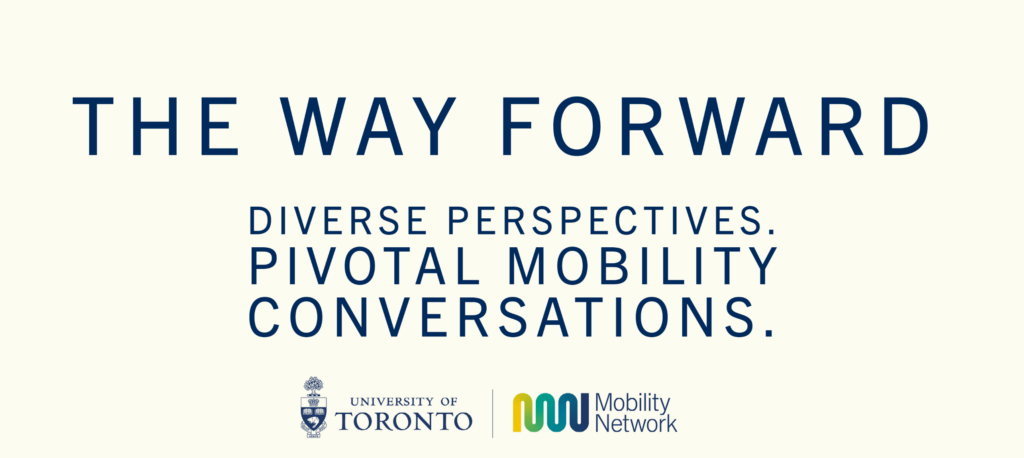
Explore the many ways mobility affects our lives at The Way Forward, a panel discussion series. Join the conversation!
All sessions take place online on Tuesdays from 4:00 p.m. to 5:00 p.m. and are free. Registration is required.
An introductory overview will be followed by short presentations, a moderated panel discussion, and audience Q & A. This event will be recorded and shared.
Interested in more The Way Forward sessions?
See the complete Spring 2023 schedule for The Way Forward.
Above: Professor Jinhua Zhao delivers Distinguished Lecture at Sidney Smith Hall, University of Toronto, March 27, 2023. (Photo: Pat Doherty).
Mobility Network was proud to co-host a visit by Professor Jinhua Zhao, the Edward and Joyce Linde Associate Professor of City and Transportation Planning at the Massachusetts Institute of Technology (MIT), on March 27 and 28, 2023. Prof. Zhao is well-known for his work at the MIT Mobility Initiative and as the host for the popular virtual weekly seminar series, MIT Mobility Forum.
Zhao came to Toronto to deliver the Distinguished Lecture for the Department of Civil and Mineral Engineering, "Behavior and computation: What defines the future of urban mobility?" the evening of March 27.
Though his visit was short, Zhao was generous with his time. In addition to delivering his public lecture and taking part in the subsequent panel discussion, Zhao met with several U of T faculty, made a guest appearance at Professor Eric Miller's graduate course "Cities as Complex Systems," and met with transportation engineering graduate students at a research roundtable.
The Distinguished Lecture event drew a large crowd.
In his welcoming remarks, Professor Brent Sleep, Chair of the Department of Civil and Mineral Engineering, said, "It's always great to see such a tremendous turnout for these Distinguished Lectures that are transportation-related. Every year I think transportation wins the prize for the widest and greatest and most number of people coming out from not just within the university, but from outside the university as well."
Professor Zhao captured audience attention from the start of his lecture.
I want to introduce a way of looking at transportation that I find rewarding.
Over time, throughout human history, we invented a fantastic set of technologies that help us move from point A to point B. Many from MIT and University of Toronto contributed to some of this design and implementation of the system.
But the question is, is the technology innovation necessarily translating into the betterment of the transportation and mobility system? That's the question I would ask.
Professor Jinhua Zhao, March 27, 2023
He explained his views in detail, drawing from research studies and sharing compelling arguments illustrated with relevant examples that always drove his points home.
Behaviour thinking is really good at identifying opportunities, while computational thinking is the one that offers the foundation, the solution to it. My research really tries to bring the two together. And you bring them together to shape individual behaviour, design systems, and reform policies.
Professor Jinhua Zhao, March 27, 2023
Following his lecture, Zhao joined Ryan Lanyon (TTC) and Professor Amer Shalaby (U of T) for a panel discussion moderated by Professor Marianne Hatzopoulou (U of T).
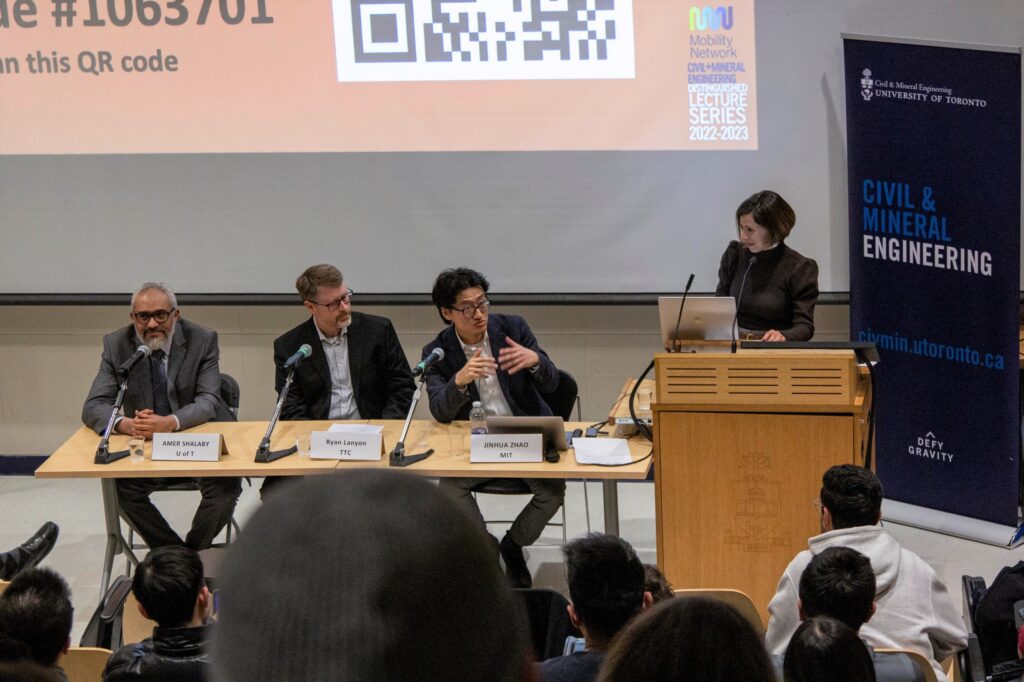
Prof. Hatzopoulou asked the panelists questions received from the audience and also blended in her own questions. Panel discussion topics ranged from a theoretical standard for basic access to mobility as a human right to the social nature of transportation.
Watch the video recording of "Behaviour and computation: What defines the future of urban mobility?"
Abstract
The transportation world is booming but in flux: the industry is being reshuffled, communities and cities are often confused and anxious about their mobility future, and the ecosystem pressure is daunting.
Mobility is in the midst of profound transformation with an unprecedented combination of new technologies: autonomy, electrification, connectivity, and AI, meeting new evolving priorities: decarbonization, public health, and social justice.
In this talk, Professor Zhao sharply focuses on two forces that drive the mobility future: behaviour and computation.
Behaviorally he investigates: Is travel social? Is travel emotional? And is travel perceptual? He uses a behavioural lens to examine mobility technologies and translates business decisions into a set of behavioural inquiries. Every single organization or company exists to change someone’s behaviour.
Computationally, he brings AI and machine learning methods to sense, predict, nudge and regulate travel behaviour. He demonstrates the power of bringing behavioural and computational thinking together, in order to make mobility services predictive, individualized, and experimental. He will illustrate how to design multimodal mobility systems that integrate shared and autonomous services with public transit.
Panel discussion to follow
Following his talk, Professor Zhao will be joined by Ryan Lanyon, Manager of New Technology and Innovation at the TTC, and Professor Amer Shalaby, Director of the Transit Analytics Lab, for a panel discussion moderated by Professor Marianne Hatzopoulou, Director of Positive Zero Transport Futures.
About Professor Jinhua Zhao
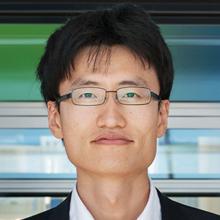
Jinhua Zhao is the Edward and Joyce Linde Associate Professor of City and Transportation Planning at the Massachusetts Institute of Technology (MIT). He integrates behavioral and computational thinking to decarbonize the global mobility system.
Prof. Zhao founded and directs the MIT Mobility Initiative, coalescing the Institute’s efforts on transportation research, education, entrepreneurship, and civic engagement. He hosts the MIT Mobility Forum, curating cutting-edge transportation research across the globe. Prof. Zhao directs the JTL Urban Mobility Lab and Transit Lab at MIT. He leads long-term collaborations with transportation authorities and operators worldwide, including London, Chicago, Washington DC, and Hong Kong and enables cross-culture learning between cities in North America, Asia and Europe. He develops methods to sense, predict, nudge, and regulate travel behavior, and designs multimodal mobility systems that integrate autonomous vehicles, shared mobility, and public transport. He is the co-founder and chief scientist for TRAM Global, a mobility decarbonization venture.
About the panel
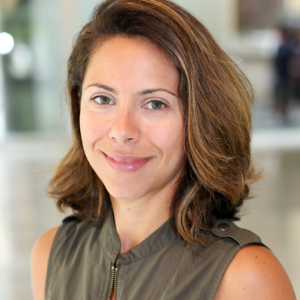
Marianne Hatzopoulou, moderator
Marianne Hatzopoulou is Professor in the Department of Civil and Mineral Engineering at the University of Toronto and Tier 1 Canada Research Chair in Transport Decarbonization and Air Quality. She leads the Transportation and Air Quality (TRAQ) research group studying the interactions between transportation, air quality, climate change, and public health; she published 150 publications on these topics. Prof. Hatzopoulou is also the Director of Positive Zero Transport Futures, a living lab ecosystem for testing transport decarbonization innovations with positive societal outcomes. Prof. Hatzopoulou is on the Canadian team of researchers who were the 2021 recipients of the NSERC Brockhouse Canada Prize for Interdisciplinary Research in Science and Engineering. In 2022, she received the University of Toronto Engineering Alumni Network 2T5 Mid-Career Achievement Award. She is an associate editor of the journal Transportation Research Part D: Transport and Environment and the incoming chair for the Transportation Research Board Standing Committee on “Air Quality and Greenhouse Gas Mitigation” (2023-2026).

Ryan Lanyon
Ryan Lanyon is the Manager of New Technology and Innovation at the TTC, having recently joined after a decade with the City of Toronto. Ryan has been working in local government for more than 20 years, starting out in demand management and providing online ridematching services to commuters. More recently, Ryan led the West Rouge Automated Shuttle Trial, developed the Transportation Innovation Zone at Exhibition Place, and recommended policies to City Council regarding micromobility. Ryan is also learning and researching methods of applying strategic foresight to prepare Toronto's transportation system for emerging and future transportation technologies.
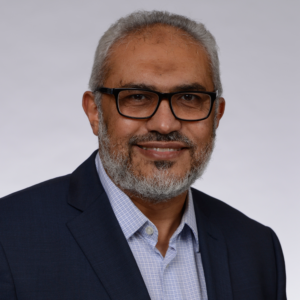
Amer Shalaby
Dr. Shalaby is Professor and Bahen/Tanenbaum Chair in Civil Engineering at the University of Toronto. He is the founding Director of the Transit Analytics Lab (TAL) and Co-Director of the Centre for Automated and Transformative Transportation Systems (CATTS). Dr. Shalaby is specialized in transit planning and scheduling, intelligent transit systems, transit operational management, transit system resilience, automated and connected transit technologies, and simulation and modelling of transportation systems. He has served on various technical committees and journal editorial boards. He also served on advisory panels of multiple transportation projects in Canada and internationally.
This free event was presented by the Department of Civil & Mineral Engineering Distinguished Lecture Series and co-sponsored by Mobility Network.
Above: Professor Baher Abdulhai (top row centre) at the Gateway to Growth Summit's breakout session "Tackling Congestion: Smart Infrastructure in the Zone," March 6, 2023. (Photo supplied by Toronto Region Board of Trade).
Professor Baher Abdulhai took part in the Toronto Region Board of Trade's Gateway to Growth Summit on March 6, 2023. He presented "Tackling Congestion with Intelligence" at the panel session entitled "Tackling Congestion: Smart Infrastructure in the Zone."
The session considered the question "What best-in-class smart infrastructure investments can help solve the crippling transportation gridlock resulting in huge costs and delays in getting products to market, choking the region’s growth potential?"
Abdulhai was joined on the panel by panelist Juan Pablo Bastida, Vice President, Public Sector, Geotab, and moderator Phinjo Gombu, Director, Economic Blueprint Institute, Toronto Region Board of Trade.
He gave a brief overview before discussing the universal cause of congestion: the demand for road capacity exceeding supply. He noted that Toronto is currently the seventh worst city in the world for congestion.
He discussed the typical solutions to congestion—reducing road capacity demand or increasing supply—before highlighting the use of intelligence to reduce congestion.
Abdulhai concluded with several promising smart applications that have the potential to reduce delays and total time spent in traffic by 20-50%:
- Adaptive Traffic Control using RL (deep reinforcement learning)
- Traffic Signals for Streets
- Ramp Metering and Dynamic Speed Control for Freeways with RL
- AV Headway Control with RL
- Dynamic Congestion Pricing: using Genetic Algorithms
- AVs for First and Last Mile
About the Gateway to Growth Summit
The Gateway to Growth Summit was a full-day event featuring expert presentations and discussion, presented by the Toronto Region Board of Trade and sponsored by Scotiabank and University of Toronto.
The area surrounding Pearson International Airport - the Pearson Economic Zone - is the second largest employment zone in Canada and the Gateway to Growth for our region. Home to a significant concentration of firms in advanced manufacturing, life sciences, logistics and warehousing, ‘The Zone’ sits at the heart of a network of highways, rail lines, and international goods movement, making its success vital to our economy and global competitiveness.
However, the Zone’s true potential remains untapped, restricted by transit availability for workers, road congestion, scarcity of employment lands, underinvestment in advanced manufacturing, and a lack of coordinated planning.
Toronto Region Board of Trade Gateway to Growth Summit
The Centre for Automated and Transformative Transportation Systems (CATTS) team at the University of Toronto invites you to their 6th annual symposium on July 6, 2023.

CATTS was established in 2017 with the purpose of quantifying and guiding the transformation of transportation systems in the era of rapid innovations in vehicular technologies and in provisioning of transportation as a service. CATTS is the first research centre of its kind in Canada to address the large-scale impacts of disruptive transportation technologies and services on our cities. It is a multi-disciplinary multi-sector collaboration that gathers academia, industry, technology experts, and the government. The centre’s mission is to guide societal transformation into a positive and sustainable direction, avoid the emergence of counterproductive travel trends, and emboldens Ontario cities as leaders in North America and the world.
Join us to learn about CATTS progress in its 6th year of research, and more.
The event will be hosted virtually and is free, but registration is required.
Agenda
9:00 a.m. Welcome and Opening Remarks, Professor Amer Shalaby
9:10-10:30 a.m. Session I - moderated by Dr. Toka S. Mostafa
Traffic Management and Control by Professor Baher Abdulhai
- Using AI-Based RM to Address Long Heavily Congested Freeways: A Case study on the QEW (Omar ElSamadisy)
- Headway Control for Autonomous Driving: A Case Study on the QEW (Lina Elmorshedy)
- Adaptive Traffic Signal Control: State-of-the-Art E-MARLIN Transformer (Xiaoyu Wang)
- SECRM: A safe, Efficient and Comfortable Automated Driving Model with RL (Tianyu Shi)
Public Transportation by Professor Amer Shalaby
- Advanced TSP (Wenxun Hu)
- Smart route management strategies (Kareem Othman)
- SPUR: Developing a Modular, Data-Driven Mesoscopic Simulation Platform to Analyze Stochastic Railway Networks (Peter Lai)
- Applications of generative AI to transit route management (Jiahao Wang)
10:30-11:00 a.m. Break
11:00 a.m. - 12:30 p.m. Session II - moderated by Dr. Toka S. Mostafa
Transportation Planning: Mobility as a Service (MaaS) by Professor Eric Miller
- Understanding the Dynamics of Vehicle for Hire Services in the Greater Toronto Area: A Comprehensive Study of Demand and Supply Patterns (Nael Alsaleh)
- Exploring Key Stakeholder Perceptions of Zero Occupant Vehicles (ZOVs)’s Impacts on Urban Areas (Lisa Losada Rojas)
Overview of AV and related MaaS Research by the Travel Demand Modelling Group (TDMG), Khandker Nurul Habib
- Modelling travel time perceptions towards autonomous vehicles in the GTHA (Felita Ong)
- Tracking Travel Demand Using Google Location History (Kaili Wang and Melvyn Li)
Transportation and Air Quality by Professor Marianne Hatzopoulou
- Implications of freight electrification scenarios for GHG emissions, air quality, health, and environmental justice (Sara Torbatian)
- Equity in the distribution of truck emissions in Toronto: Evidence from the past decade (Jad Zalzal)
Freight Modelling and Logistics by Professor Matthew Roorda
- Simulation of the performance of a person-following robot in crowded pedestrian environments (Farah Ghazzawy)
Computer Vision
- Computer Vision - Status update on North York Traffic Testbed (Kartikeya Bhargava)
12:30-1:30 p.m. Break
1:30-2:30 p.m. Guest Speakers' Session moderated by Dr. Toka S. Mostafa
1:30-2:00 p.m. "Insights on the Jacksonville Transportation Authority's Ultimate Urban Circulator Program," by Bernard Schmidt, Jacksonville Transportation Authority
2:00-2:30 p.m. "Combatting Escalating Congestion: What ITS and AI can do, cannot do, and what to expect," by Professor Baher Abdulhai
2:30-2:45 p.m. Closing remarks
Registration
Register on Eventbrite for this virtual event.
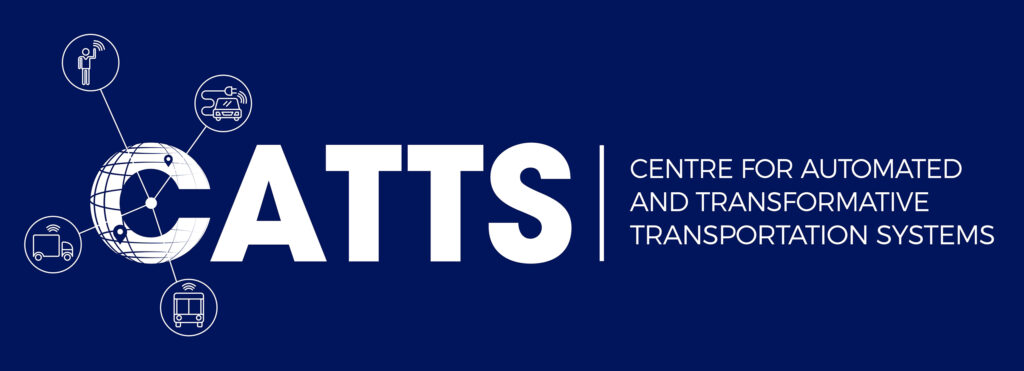
Parking supply and demand are often imbalanced in urban areas, causing adverse consequences such as excessive search times and long walking distances. Many parking authorities manage parking demand using pricing strategies such as fixed daily fees, hourly pricing, time-of-day pricing, progressive pricing, or dynamic pricing.
This presentation discusses the challenges and solutions related to parking pricing, including data availability, occupancy detection, and price-setting.
About the speaker
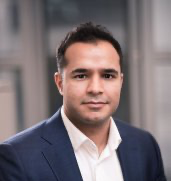
Dr. Mehdi Nourinejad is an Assistant Professor in the Civil Engineering Department of York University. His research expertise is in managing transportation systems, including parking systems, automated and electric vehicle technologies, micro-mobility services, intelligent transportation systems, and traffic flow theory.
Presented by University of Toronto ITE Student Chapter, UT-ITE. Free. All are welcome.
If any specific accommodations are needed, please contact ite@studentorg.utoronto.ca. Requests should be made as early as possible.
Positive Zero Transport Futures and Mobility Network will host the Emerging Mobility Scholars Conference June 22-23, 2023 at the University of Toronto.
We invite graduate students and postdoctoral fellows across Canadian institutions to join us in person at the University of Toronto to exchange ideas and showcase your research relative to mobility and climate change.
The conference theme is:
Cause or Solution? Urban mobility in an era of climate emergency
Due to socioeconomic shifts and the need to achieve deep cuts in greenhouse gas (GHG) emissions, Canada will experience an unprecedented transformation in urban infrastructures, policy responses, and new technologies.
Nowhere is this truer than in the transportation sector, which is one of Canada’s largest GHG emitters and has historically been relatively impervious to change due to its extreme dependency on fossil fuels.
This transformation in our mobility systems needs not only to mitigate climate change but also enable community benefits in an equitable manner. It is crucial that efforts to decarbonize our urban areas be informed by the co-benefits of GHG reduction.
Conference topics
- Co-benefits of decarbonization
- Land use and transportation planning
- Technological response to climate change
- Equity and environmental justice
- Transportation and health
- Urban resilience planning
- Planning and politics of climate change
- Air pollution in a changing climate
- Climate extremes: Data and modelling
Call for Abstracts
- Abstracts to be 300 words or less.
- All abstracts must be submitted by March 10, 2023.
- Submit your abstract through the submission web portal or this QR code:
Visit our event post for more details.
Applications are now closed
Mobility Network is proud to host its 2023 summer school on the theme “Measure what matters: Urban mobility in an era of climate emergency.”
The summer school will take place June 20 and 21, 2023, at the University of Toronto’s St. George campus.
About the summer school
The purpose of Mobility Network Summer School 2023 is to develop a roadmap for evaluating government investment in transportation infrastructure.
Working in teams, students will design a performance measurement framework to quantify the economic, climate, and societal impacts of transportation infrastructure investments and methods to quantify the measures they choose to include in their framework. Then, they will apply their measurement framework to a case study of a previous or planned transportation investment, for which funding may or may not be confirmed, to determine if the investment should proceed. Teams will draft policy briefs (200-300 words) that articulate in lay terms why their assigned project is a good or bad investment.
A set of short lectures will present methods to measure travel demand, economic impact, GHG emissions, and social impacts, among others.
A reading list of background materials will be provided in advance of summer school.
Instructors
- Professor Marianne Hatzopoulou, Department of Civil & Mineral Engineering, University of Toronto
- Professor Daniel Posen, Department of Civil & Mineral Engineering, University of Toronto
- Professor Laura Minet, Department of Civil Engineering, University of Victoria
- Dr. Junshi Xu, Research Associate, Department of Civil & Mineral Engineering, University of Toronto
Syllabus and reading list
Download the Mobility Network Summer School 2023 syllabus.
Requirements
There is no cost to attend, but space is limited. Applicants must:
- be graduate students or postdoctoral fellows at a Canadian university;
- commit to attend the summer school from 12:00 p.m. to 5:00 p.m. on June 20, 2023, and 9:00 a.m. to 5:00 p.m. on June 21, 2023;
- submit an application;
- if accepted, bring their own laptops.
Schedule
Day 1: Tuesday, June 20, 2023
12:00 p.m. Lunch and registration
12:45 Introduction: Prof. Marianne Hatzopoulou
1:15 Brief presentations on case studies : Dr. Junshi Xu
2:00 Guest speakers (30 min. each): Prof. Marianne Hatzopoulou, Prof. Daniel Posen, Prof. Laura Minet
3:30 Breakout groups around each case study. Groups go over case studies together; Identify roles and prepare a plan for the development of the performance measures and quantification approaches.
5:00 Groups report on chosen case study and proposed plan
5:30 End of Day 1 program
6:00 Welcome reception (optional) to 8:00 p.m.
Day 2: Wednesday, June 21, 2023
8:30 a.m. Breakfast available
9:00 Break-out groups identify a list of indicators that they believe are important, that can be measured, and which are relevant to their case study
10:45 Break-out groups develop methods for quantifying each indicator and identifying data needs
12:30 p.m. Lunch
1:30 Break-out groups estimate/guess the potential outcomes of the case study in terms of their indicator framework
3:00 Break-out groups prepare a 200-word policy brief (a short summary of how their work can enhance the evaluation of the case study) and final presentations
3:30 Groups report on work
4:30 Completion of Summer School feedback survey
4:45 End of Day 2
Applications are now closed
Mobility Network 2023 Summer School is fully subscribed, and applications are closed. We regret that capacity is limited.
Notification of results
Notifications confirming acceptance were be emailed to applicants on a rolling basis.
Emerging Mobility Scholars Conference 2023
We recommend that summer school participants also register to attend the Emerging Mobility Scholars Conference which directly follows Summer School on June 22-23 at the University of Toronto. Get the details and register (free). Abstract submissions close March 10.
Co-sponsor
Mobility Network Summer School 2023 is co-sponsored by Positive Zero Transport Futures, Department of Civil & Mineral Engineering, University of Toronto.
Questions?
Email us at mobilitynetwork@utoronto.ca.
Professors John Robinson and Kim Slater have been awarded a SSHRC Connection Grant to design and deliver three workshops in 2023, part of the Urban Climate Action Program (UCAP), to facilitate the exchange and mobilization of strategies to reduce GHG emissions in Toronto related to (1) mobility, (2) energy, and (3) waste.
In partnership with the City of Toronto, three interdisciplinary U of T networks (Climate Positive Energy, the Mobility Network and SDGs@U of T, the Net Zero Workshop Series) will convene and engage an array of Toronto-based industry and community organization representatives, and through transdisciplinary knowledge exchange, identify the real-world barriers they face in meeting the TransformTO Net Zero Strategy goals, and ultimately, lead to the co-production of multi-sectoral and multi-stakeholder solutions.
These workshops will be shaped by and inform research agendas within UCAP and the U of T networks; they will also facilitate the flow and exchange of practitioner and research knowledges with key audiences within the University of Toronto, the City of Toronto, and local communities of private sector and civil society actors.
An exploration of infrastructure and time led by Professor Shoshanna Saxe, Canada Research Chair in Sustainable Infrastructure
Making priorities about infrastructure investment is increasingly a focus of politics and government debates. However, too often the discussion and imagining of infrastructures futures is divorced from practical considerations of time. We cannot wish large projects or new systems into existence; it takes years to decades to plan and physically construct heavy infrastructure. Further, once operating, civil infrastructure is near permanent making it critical to not build the “wrong" projects. However, we can also not accept doing nothing, or delaying too long, given pressing social and environmental need. In addition, long term projects still need to be started and stewarded over the shorter term.
The dual needs to prioritize effective rapid approaches to infrastructure in the near term without investing in dead ends, while simultaneously establishing robust planning and decisions processes for large infrastructure investments that take decades, makes the exploration of time and infrastructure complex and pressing.
This workshop is invitation-only.
Workshop goal
The goal of this workshop is to discuss a short term infrastructure horizon. What can and should we do on the 1 to 5 year time scale?
This work contributes to three ongoing discussions within the infrastructure sector:
- The increasing infrastructure deficit,
- The need to rapidly adapt infrastructure systems for climate change, and
- Barriers to infrastructure development (limited budgets, conflicting stakeholder perspectives, institutional intransience).
Agenda
9:45 a.m. - Doors open. Coffee, tea, and water available.
10 a.m. - Workshop commences.
12 noon - Lunch.
Sponsors
This workshop is funded by the Royal Academy of Engineering Distinguished International Associates Round 2 and the University of Toronto Mobility Network.
We welcome Dr. Nael Alsaleh as Mobility Network Postdoctoral Fellow for the City of Toronto Zero-Occupant Vehicle Project supervised by Professor Eric Miller.
Nael completed his BSc in Civil Engineering in 2015 and MSc in Transportation Engineering in 2017 at the Jordan University of Science and Technology (JUST). His MSc thesis won the first-place award in The Best Master’s Thesis Competition at JUST for the 2017-2018 academic year.
Nael went on to earn his PhD in Transportation Engineering in December 2022 from Toronto Metropolitan University under the supervision of Professor Bilal Farooq. His dissertation focused on exploring network designs, developing demand models, and evaluating the sustainability of on-demand public transit systems.
Nael's research interests include travel demand modelling, the operation and planning of CAVs, and on-demand shared mobility services.
He comments:
As part of my PhD studies at TMU, I spent the last three years in Toronto. It's a place I call home now, and I aspire to be part of its future prosperity and development.
When it comes to transportation and transportation planning, one cannot hope for more than being part of the Mobility Network that provides mobility solutions for our growing cities to flourish sustainably at the heart of the University of Toronto, a leading institute not only in Canada but worldwide.
I look forward to working with the lead researcher, Professor Eric Miller, on the "Zero-Occupant Vehicles" Project, which will inform the City of Toronto of the potential impacts of ZOVs and provide strategies to mitigate them.
Dr. Nael Alsaleh
We welcome Dr. Gaurav Mittal as a UTM Mobility Network Postdoctoral Fellow supervised by Professor Shauna Brail.
Gaurav comes from an interdisciplinary background. He completed his PhD in human geography at the National University of Singapore in 2021 with a prestigious President’s Graduate Fellowship. He also holds a master’s degree in urban policy and a bachelor’s degree in architecture.
He received the Prestige Prize for his PhD research from the World Conference on Transport Research Society in 2019.
Gaurav’s academic interests lie at the intersections of urban transport, policy mobilities, and governance. He brings these categories together to critically examine the role of the state in ordering urban societies.
He has more than six years of full-time research and professional experience and seven years of part-time teaching experience in India and Singapore.
Gaurav says that after working in the Global South context for quite some time, he is looking forward to working with University of Toronto researchers and “the opportunity to widen my horizons and learn more about how platform mobilities are functioning in the Global North context.”
My work engages with the study of biopolitics by explicitly investigating the governmentalities that shape material urban mobilities. It gets to the heart of ongoing urban planning and governance discussions and debates over social inequality and sustainable urban futures.
In some sense, we kind of think that the mobilities in North are different than South, but I think that there are many common things which can be explored between these “imaginary” boundaries – boundaries which have been created in the discourse of North and South.
I believe this opportunity will help me develop a comprehensive understanding of global urban transport governance and contribute to a more engaged North-South dialogue in mobilities research.
Dr. Gaurav Mittal

